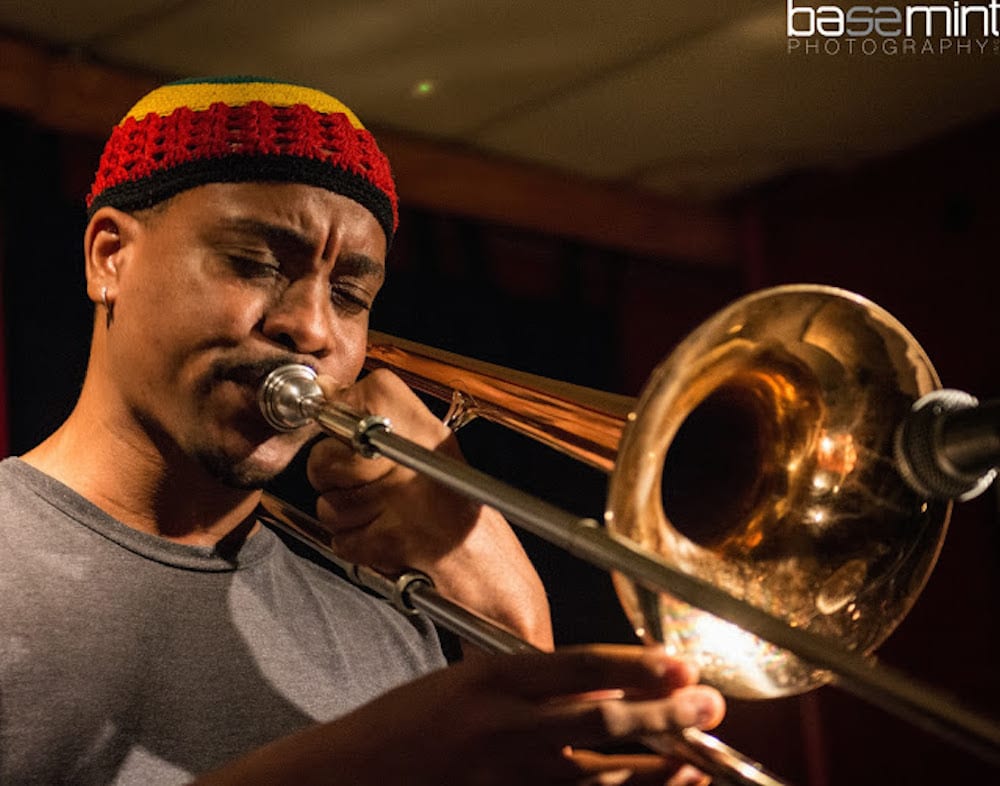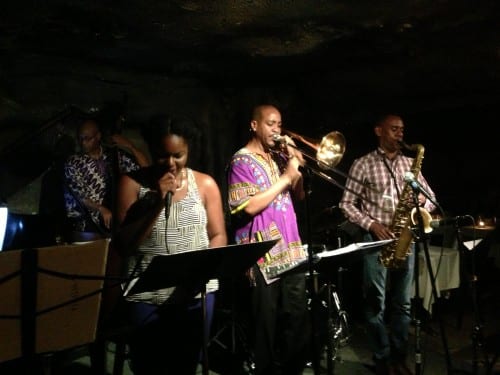Reginald Cyntje delivers music from Spiritual Awakening, a soulful and serene new project

Reginald Cyntje
Bohemian Caverns
Friday, Aug. 29, 2014
To Reginald Cyntje, it must have felt like home. The air down in Bohemian Caverns was heavy and wet, the way it feels before a tropical storm. It was the late set on Friday, Aug. 29, and the patrons sat uncomfortably in their weekend clothes. A woman dabbed her face and neck with a napkin. Two older men in bright shirts fanned themselves listlessly with menus. A college kid’s date got up from the table and he checked his polo for armpit stains.
A Virgin Islands native, Cyntje seemed unfazed, posted by a giant warehouse fan, sweat beading on his head and cheek. The trombonist’s presence was serene and confident as he shuffled through his music, instilling an air of experience and internal peace in the whole band. They slid calmly into the first tune, “Prayer,” smooth and bass-driven accented by Brian Settles’ fluid, looping saxophone. The Caverns provided a hot island night; Cyntje’s new project, Spiritual Awakening, would be the cool ocean breeze.
Although it’s not recorded yet, Spiritual Awakening contains the makings of the D.C. trombonist’s fourth album, planned on the heels of the acclaimed 2013 release Elements of Life. If Cyntje downplayed some of his native island influences in his last project, they are firmly in back in focus with the Spiritual Awakening project, blending Caribbean rhythms and instrumentation with elements of faith traditions from around the world. The basic message behind Cyntje’s art remains largely intact. While Elements exudes love and natural oneness, Spiritual Awakening is about humanity’s unity with the divine, and one another. In one of his few statements from the bandstand, Cyntje smoothly told the audience, “We have more in common as humans than different. This music is to reflect that.”

To even the casual listener, it’s clear Cyntje’s music was written to reflect his deep-seated spirituality. The low, pensive groove of his tune “Awakening” pairs perfectly with Settles’ tenor, which that night was a haunting, almost syrupy sound, all the notes blended together but each placed perfectly to drive the tune forward. When Cyntje stepped up to the mic, his long, ascending brassy slurs sent a shiver through my entire body. Then, from nowhere, the tune exploded into a deep Afro-Caribbean groove, driven by the rhythm section of Tim Whalen on piano, Victor Provost on steel pan, Herman Burney on bass, and Amin Gumbs on drums. Cyntje peppered the audience with aggressive double-tongues and sudden growls before the rhythm section took it home with a loud extended vamp. The performance spoke to Cyntje’s remarkable flexibility and facility on his instrument. He is, at the core, a player of contrast and taste, even within his own meticulously constructed idiom. One moment his horn snarls and barks like Wycliffe Gordon, and the next he’s flutter-tonguing in the upper register.
Spiritual Awakening is a reminder that Cyntje remains one of the region’s most innovative and passionate trombone players. Each member of his septet can be counted as one of the leading lights of their instruments, including Whalen, who filled in for Cyntje’s regular keys man Allyn Johnson. Whalen was in particularly fine form on “Rejoice,” a funky, up-tempo Afro-bop tune. He took the first solo and ignited the entire band. His ability to capture not just the style but the substance of Cyntje’s musical message stood out at a gig where the leader was debuting nine unperformed compositions. Victor Provost was noteworthy as usual on his steel pan, sharp as always with fantastic technique and refined phrasing. He seemed to communicate particularly well with the bassist Herman Burney, who found the pocket on each tune.
Spiritual Awakening shows again that Cyntje’s group has all the markers of a mature, thoughtful band, but even at the Caverns they had their shortcomings. The slower tunes, particularly near the critical beginning of the set, seemed to lull the audience into a spiritual, nearly meditative mindset, but failed to jolt them out of it. Whether it was the music, the heat, or Cyntje’s cool, understated stage presence, the audience reaction was muted for much of the show, needing up-tempo numbers to pique its curiosity again. The trombonist’s round, hollow tone added a beautiful color to the slower pieces, but it also at times failed to stir the blood at a low tempo. It’s clear he and his band are most comfortable doing what they do best—fusing reggae or Quelbe rhythms with the jazz vernacular—but as a result do not step out of their own idiom as much as in the past.
These critiques would mean little to Cyntje because his music means so much. Watching from Bohemian’s back row, there were times when even a committed atheist could have felt the spirit wash over him. While one of Cyntje’s partners soloed he would often close his eyes and tilt his face toward the ceiling, swaying back and forth with the rhythm. Other times he would walk off the stage to dance on the side, while the rhythm section vamped. It was only after the show that I realized why Cyntje made this music. It’s not there to entertain you. It’s there to show you what a connection to the divine can do.

